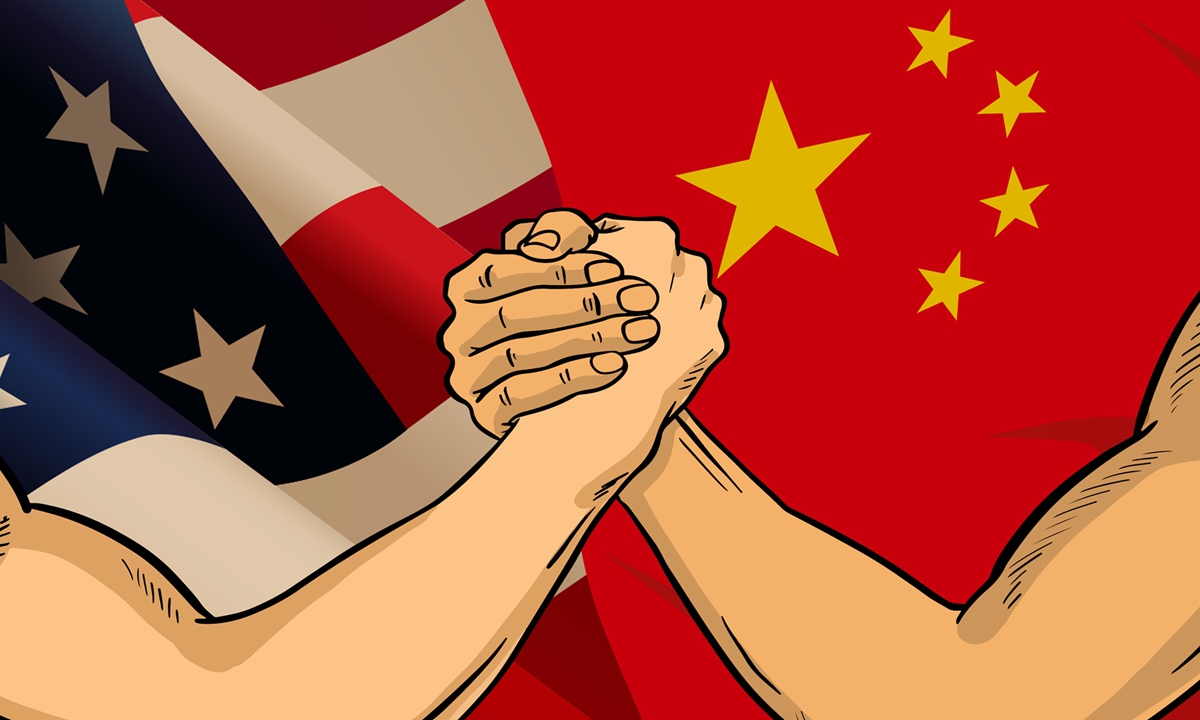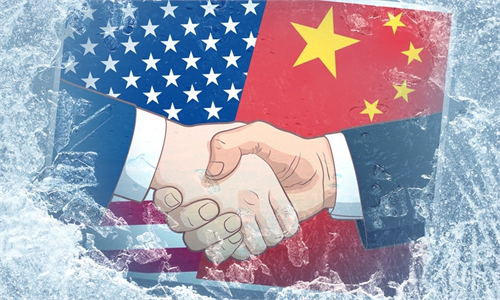
China-US Photo:GT
Ferocious confrontations in China-US relations have continued to emerge since US President Joe Biden took office. But the more the US tries to suppress and contain China, the more it cannot conceal its strategic anxiety and inability to do so. Reality has proven that both time and trends are on China's side. In particular, three high-profile encounters between China and the US this year demonstrate this fact.
First, during the China-US high-level strategic dialogue in Anchorage in March, the US misjudged the situation and attempted to overwhelm China with its strengths. However, this was strongly retorted by China's top diplomat Yang Jiechi, who said that "the US is not qualified to say it wants to speak to China from a position of strength."
The second encounter happened at the 46th session of the United Nations Human Rights Council. Some Western countries, including the US, tried to interfere in the internal affairs of other countries by hijacking the rights to define and interpret human rights issues. However, a large number of developing countries expressed their support for China's stance and measures on issues related to Hong Kong and Xinjiang.
The third one regards the escalated Palestine-Israel conflict in May. China, together with relevant countries, urgently drafted a UN Security Council statement on this issue. But Washington blocked it three times in a week. Once again, the US placed itself in opposition to the international community.
The three encounters have shown that the aggressive US has played the wrong game and ended up making a fool of itself. They also have demonstrated that China has many means to deal with struggles at the international level. The country never lacks friends and partners, and each contest has enhanced China's influence.
It is a big gamble for the US to continue using its alliance to encircle China. Kurt Campbell, the US coordinator for Indo-Pacific affairs on the US National Security Council, said on May 26 that the era of engagement with China is over and "the dominant paradigm is going to be competition." This is true in many ways, as we can see in the US' recent actions toward China.
Politically, Washington continues to viciously attack Beijing's political system under the banner of "democracy" and "human rights." In terms of trade and technology, it carries on with its policy of decoupling, sanctions, and banning. In the area of military and security, it has strengthened the allocation of geopolitical resources and enhanced its mechanism in the Indo-Pacific region. And it tries to exert maximum pressure on China by strengthening its alliance and forming small cliques.
The US sees its alliance system as an "amplifier" of its power. It wants to use the "rally round the flag" effect to disguise its unilateralism as multilateralism. In essence, this is all to serve its hegemony. Nevertheless, the web of the US alliance network is full of holes.
First, the US is facing a huge gap and asymmetrical relationship between its strategic calculations and overall strengths. The country is visibly declining in terms of power, and it has become a serious constraint to Washington's actions. The US finally decided to end the war in Afghanistan completely after 20 years. This indicates that there is eventually a price to pay for being capricious.
Second, Washington is using the carrot-and-stick approach toward other countries to form small cliques. However, it is against these countries' need of seeking self-interests. The interests of Washington are not necessarily the same as those of other countries. There are also fewer and fewer US allies that are willing to follow the steps of the US and sacrifice their interests for the benefit of Washington.
Third, the US has forcibly divided the world by ideology, and this goes completely against the current trend of the times. In an era of global connectivity, huddling up in a cocoon of ideology is really binding one's hand and foot. The US used to represent opportunity. Now, it is China that does.
Today, China can look at the world on an equal footing. It means that China's major-power diplomacy with Chinese characteristics will keep evolving. This also means that China will be more determined to safeguard its sovereignty, security, development, reputation, and dignity. This shows that China is now in the best period of development in modern times - with both time and trends clearly on China's side.
The author is research fellow and executive vice president of the China Institute of International Studies. opinion@globaltimes.com.cn



